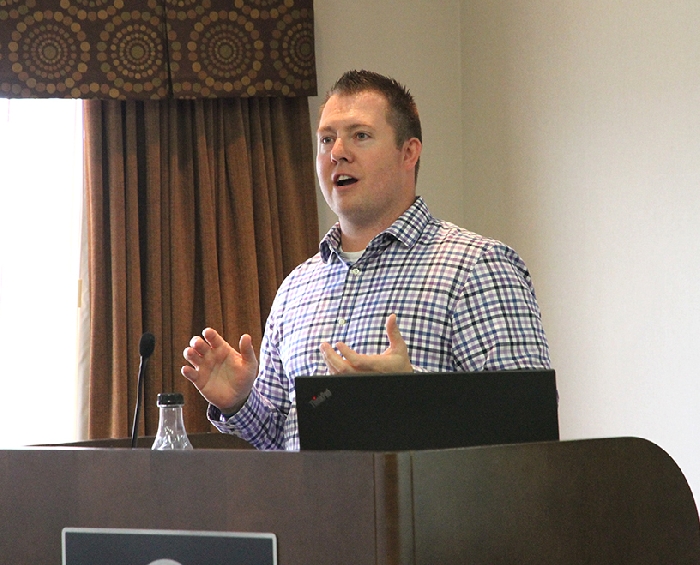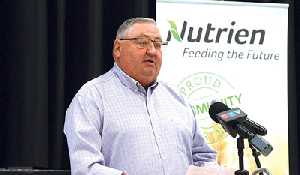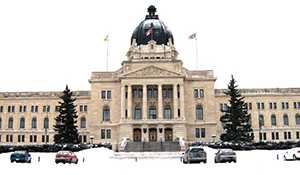MNP says tax changes would hit businesses owners hard
September 25, 2017, 9:01 am
Kara Kinna


According to the federal government, proposed tax changes for small businesses will level an unfair playing field, but on Thursday, Sept. 14 at the Moosomin Chamber of Commerce meeting, accounting firm MNP said that’s far from the case.
Mark O’Rourke with MNP Moosomin gave a presentation, breaking down the effects of the tax changes on small businesses. In his presentation he compared the taxes that small businesses pay under current legislation to the taxes paid by wage earners.
His conclusion? On close examination, small businesses already pay as much tax as wage earners, and new proposed legislation would mean they would be paying much more tax than is fair. Businesses pay business income tax on any profits, then the owners pay taxes on dividends paid out from the company. The two taxes add up to equal the taxes paid on wages and salaries.
“These are the biggest single changes we have seen in the tax law in the last 45 years. And they are all at once, and they are big. They impact businesses coast to coast,” he said in his presentation.
“They (the federal government) are saying these are only supposed to affect the top one per cent. I can tell you, in a lot of cases, that top one per cent is paying a lot less tax because are using tax havens. There are people who have operations in the Bahamas because it’s tax free, and they can afford the really expensive lawyers who can set those up. And I can tell you those lawyers are really busy right now setting more of those up. So are we really going after the top one per cent? Possibly not. Here we are going after the middle class.”
Business owners across the country have raised concerns about the proposed changes and O’Rourke said those concerns are legit.
“One thing that business owners are concerned about is that the government keeps drawing parallels between employees and entrepreneurs and keeps saying they have to be fair to the same thing,” he says. “But they are not the same. An employee gets a T4, they have job security, they don’t have to worry about the cash flow in the business, they don’t have to worry about how the bills are going to get paid, they get sick days, they get vacation days, they probably get EI, they get benefits possibly, they get a pension. They get all of these things.
“Business owners don’t get sick days. If they are on vacation and something bad happens they are on their way home. They don’t get maternity leave, they don’t get EI in a lot of cases, they don’t get a pension unless they’ve set that up, and in most cases business owners leave money in the company because that’s their retirement. That’s their pension.
“The government keeps saying these two groups need to be fair, but there are vastly big differences between the two groups.”
One of the changes being proposed by the federal government is increasing tax on passive income—such as income made on investments within a corporation. O’Rourke pointed out that that increase would result in a taxation rate of 71 per cent.
“The problem here is that the proposed changes have a very far reaching economic impact,” he says. “If businesses have less to invest in their business, are they going to invest any more in their business? How is business going to grow?
“The proposals would absolutely reshape every retirement strategy that we’ve already employed. Everything that we’ve planned for people for the last 45 years may be no good. What do we do now? Because now they (businesses) don’t have enough based on what they were planning.
“In theory the far reaching impacts may actually slow down business development, because whose going to invest in new businesses if it’s going to cost them so much money?”
O’Rourke said, when looked at from an accounting perspective, there is nothing fair about the proposed tax changes. He said small businesses pay as much tax as anyone else, they simply tend to pay half of it when they go to sell or cash in their assets, rather than right away.
“Justin Trudeau’s flat out comments were ‘People who make $50,000 a year should not pay higher taxes than those who make more than $250,000.’ But that’s not the case,” said O’Rourke. “We just went through some examples. It works out at the end of the day that everyone is paying the same amount of tax. It’s just when do you pay that tax? Today or tomorrow. It all gets there eventually.”
He said the federal government needs to slow down and review what they are doing, but they seem to be in a rush.
“If they really want to pursue it, slow this down and let’s make this right. Let’s figure out what’s actually fair, because what they’re proposing isn’t actually fair,” he says.
“The worry is that these new anti avoidance rules may impact other things that they haven’t thought of. It’s going to create more tax dollars everywhere.”
He said businesses need to be very cautious about any big restructuring decisions they make.
“Essentially what we are saying is that if you are going to do anything at this time—selling, buying—be very cautious and seek professional advice before reorganizing your business. Don’t do anything without seeking professional advice, because you may unintentionally do something that just cost you a lot of tax dollars. Because other things are falling under these tax rules that maybe it wasn’t intended, but by the way it’s written they will.”
He said businesses need to express their concert to the government.
“We ask that business communities speak your voice. Be vocal about the changes because they are going to impact you whether you think they are or not,” he says.
“The government needs to understand the business community is not happy about this, that the impacts could be a variety of things.
“If a business owner wants ‘x’ amount of dollars in their pockets at the end of they day, they are going to get that, and if that means they are going to cut jobs, then they are going to cut jobs. If that means they need to raise their prices, they might raise their prices. There are a whole variety of different ways you get the same end result.
“It may restrict future development in business. It may restrict growth. What’s the long term impact on the economy? Nobody knows, but probably not good. And it’s going after a lot more people than it’s intended to. Because that top one per cent—it’s not a big number of earners in Canada—that top one per cent, they earn big dollars and they employ tax strategies that a middle class business owner just can’t afford. And they’re not paying those taxes.”
Souris-Moose Mountain MP Robert Kitchen was at the meeting and spoke about the proposed tax changes after O’Rourke’s presentation.
“I have heard more on this piece of legislation proposal than any other legislation in my term so far,” he said. “I have gotten more correspondence in the past week, and comments, and people coming up to me and talking to me about issues on this particular issue than any other.”
“This is a big concern. The realty is that this is going to hit middle class Canadians, our farmers, our small businesses, more than it’s going to hit our one-percenters.
“That one per cent—the Justin Tredeaus and Bill Morneaus who have big corporations and companies that have taken their money and pushed it off to other areas—are not going to be affected by this at all because they will have ways to avoid it happening to them.
“At this present time Trudeau is giving money out left, right and centre and he needs money right away. And this is a way that he can get that money now instead of 20 years from now.
“He talks about income sprinkling. He is basically sprinkling wealth around Canada by doing what he’s doing here.
“I can tell you my colleagues are not on board with this. We will continue to fight that and spread information. You need to continue to write me the letters that you’re writing me and I will respond to you as quickly as I can.
“I also ask you to send them not only to me but to send them to the prime minister and Minister Morneau and flood their offices with those letters.
“They need to know this is going to have a huge impact on small business and the middle income Canadians, moreso that what he intended to.
“And he’s basically penalizing the people he got elected by saying he was going to support and help.
“There are unintended consequences that will come out of this and the more they are revealed, the better. I will be that voice for you, but I need you to do that as well so we can continue to fight this.”



































